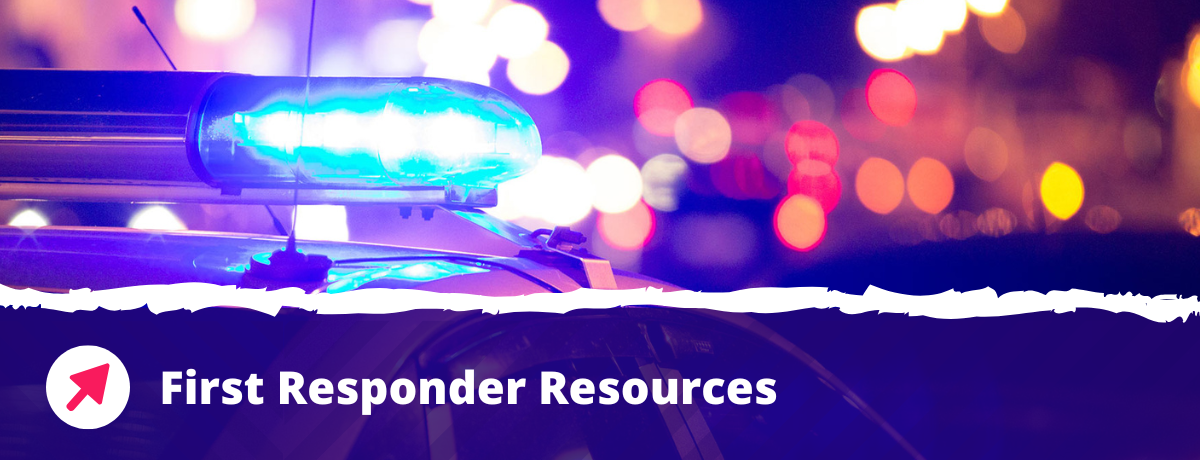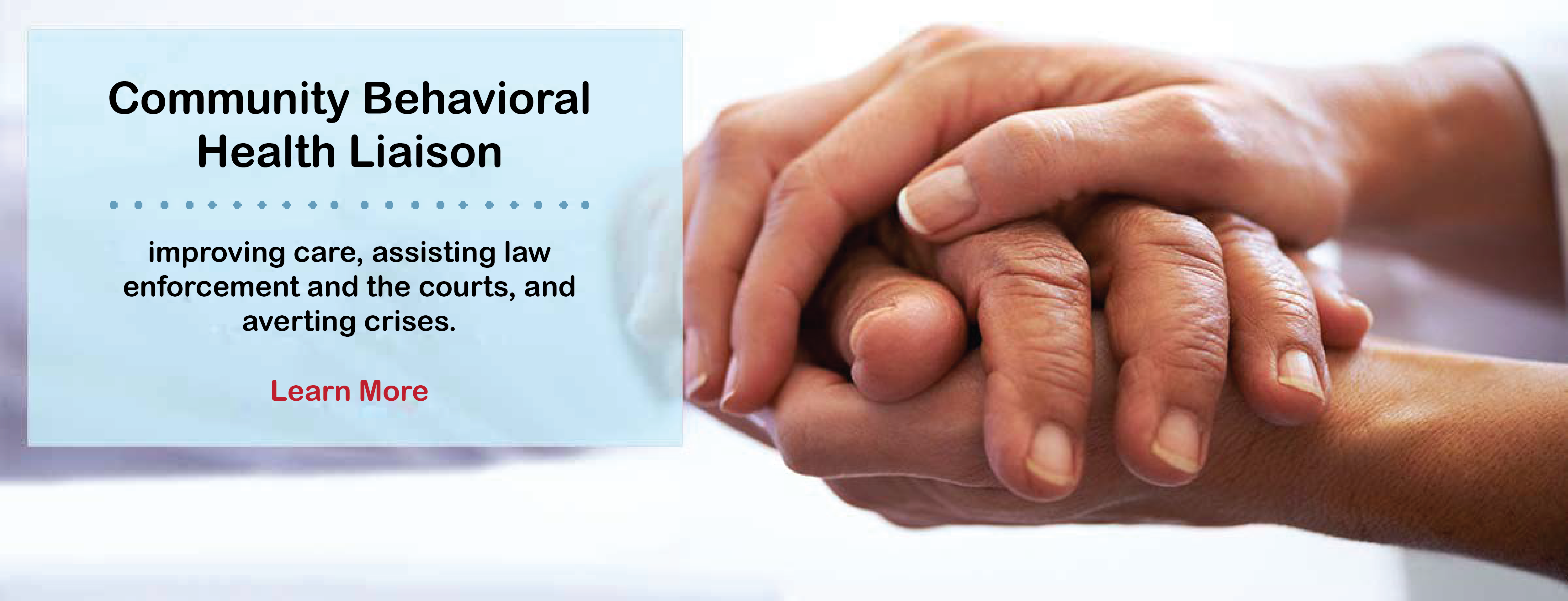First responders are the first to arrive and provide assistance or incident resolution at the scene of an emergency. Due to the first responder job demands, first responders have the potential for burnout, stress, PTSD, suicide risk, and various other mental health issues.
DMH is committed to finding, creating, and/or sharing resources for first responders.
First Responder Resources
- First Responder Provider Network
First Responder Provider Network
Established in 2018, The MO CIT Council identified a list of trained behavioral health professionals who specialize in helping first responders struggling with depression, anxiety, relationships, post-traumatic stress symptoms, and more. The providers on this network understand the unique professional culture and are trusted and vetted by first responders.- Post Critical Incident Seminar
Post Critical Incident Seminar
The Missouri State Highway Patrol has a Post Critical Incident Seminar which is a 3-day intensively focused therapeutic seminar to assist first responder personnel suffering from traumatic stress following their involvement in a critical incident(s), such as officer-involved shootings, mass casualties, line of duty deaths, etc.- Wellness Resources
Trauma Death Notification Resources
- Online FBI Trauma Notification Training
- Death Notification When Children are Involved: Trauma Informed Strategies for Delivering the Most Difficult News
A Guide to Managing Stress for Disaster Responders and First Responders
First Responders and Disaster Responders Resource Portal
The Substance Abuse and Mental Health Services Administration compiled a resource portal for first responders to learn more about the signs of stress, stress management skills, and other practical resources.First Responder Wellness Book Resources
Advanced Brain Therapy for Veterans and First Responders in MO
Public Safety Professionals
The National Alliance on Mental Illness compiled resources for public safety professionals on various tops: resilience, support, wellness, and more.Office of Disaster Services
The Office of Disaster Services compiled resources for various topics to assist individuals in crisis or those responding to the crisis.- Wellness Education
Warrior's Rest Foundation Training
In 2018, the Missouri Department of Public Safety launched a training program to teach first responders - law enforcement, fire service, EMS and dispatchers - how to identify and deal with the stress that can come with their jobs. Free classes are offered several times a year in Jefferson City, Columbia, Springfield, Joplin, Cape Girardeau, St. Louis, Kansas City and more.DMH Content Hub
Take free educational courses on mindfulness and stress management; trauma-informed care and peer support; mental health management and overall wellness; and so much more. These courses are for professionals or individuals to broaden their knowledge and techniques to make a meaningful difference in the lives of others.First Responder Wellness Animated Series
Watch an entire animated series focusing on first responder wellness.- Fit For Duty Evaluations
A "first responder fit for duty evaluation" is a specialized assessment conducted by a qualified medical professional to determine whether a first responder (police officer, firefighter, EMT, etc.) is mentally and/or physically capable of safely performing their job duties, typically triggered when concerns arise about their ability to function effectively due to potential psychological issues, substance use, and/or significant physical impairments; it often involves a combination of clinical interviews, and psychological tests. A medical records review and physical fitness test may also be needed to evaluate fitness for duty in high-stress situations.
Key points about first responder fit for duty evaluations:
- Purpose: To assess if a first responder's mental and/or physical health is sufficient to safely perform their job, protecting themselves and the public.
- Who conducts it: A licensed psychologist or psychiatrist, sometimes in collaboration with a medical doctor, depending on the specific needs of the evaluation.
- When it might be required:
- After a critical incident
- Following a concerning behavioral change
- When there are reports of impaired performance
- As part of a routine wellness check
- What is assessed:
- Mental health conditions such as depression, anxiety, PTSD, etc.;
- Cognitive abilities such as decision-making and judgment;
- Substance use; and/or
- Physical fitness level, including strength, endurance, and mobility.
- Evaluation process may include:
- Interviews: Discussing personal history, work experiences, and current concerns;
- Psychological tests: Standardized tests to assess mood, personality, and cognitive function;
- Medical records review: Reviewing past medical history and treatment records;
- Physical examination: Depending on the agency, may include physical fitness tests or medical screenings.
- Outcome:
- Fit for duty: The first responder is deemed capable of performing their job safely;
- Conditionally fit for duty: May require further treatment or monitoring; or
- Not fit for duty: May require temporary or permanent removal from duty, depending on the findings and agency policy.
Fit For Duty Evaluation Contact Information:
Psych Associates
1358 E Kingsley Street, Suite E
Springfield, MO 65804
P: (417) 414-0333
Therapy & Counseling for Adults, Couples, Children | Springfield MOCURE Counseling & Assessment Training Centre
Dr. C. Steven Shaffer, Ph.D., LPC, NBCC (Board Certified)
6382 Riverglen Rd.
Ozark, MO 65721
P: (417) 323-0580Gateway Behavioral Health Consultants
11960 Westline Industrial Dr., Suite 265
St. Louis, MO 63146
P: (314) 325-2685
- Purpose: To assess if a first responder's mental and/or physical health is sufficient to safely perform their job, protecting themselves and the public.
Resources to Assist Others in Crisis
- Community Behavioral Health Liaisons
Community Behavioral Health Liaisons
The Community Behavioral Health Liaison's goal is to form better community partnerships between Community Mental Health Centers, law enforcement, and courts to save valuable resources that might otherwise be expended on unnecessary jail, prison, and hospital stays and to improve outcomes for individuals with behavioral health issues.- Behavioral Health Crisis Centers
Behavioral Health Crisis Centers (BHCCs) provide care that brings the person back to their previous level of functioning before the crisis started. They connect the person to community resources to make sure the person stays safe and has a plan to help prevent future crises. BHCC’s provide walk-in services. They also give first responders options other than taking the person to the emergency room or jail.
Crisis Services Certification Standards/Code of State Regulations
Missouri Behavioral Health Council/Crisis Stabilization Units
- Missouri Crisis Intervention Teams
The Missouri Crisis Intervention Teams (MO CIT) Council is a network of representatives from each established local CIT council across the state, Community Behavioral Health Liaisons (CBHLs), state agencies and associations, and those with lived experience. The Council works to address any structural barriers at the state level and advocates for policy and legislative changes that may be necessary to support health and wellness.
- DMH Crisis Resources
DMH Crisis Services
Crisis Services are for anyone, anywhere and anytime. They are the first line of care in helping people and preventing tragedies. DMH strives to use the best tools and practices to meet the needs of people in crisis.Crisis Resources for First Responders - This document can be printed and posted in break rooms, squad rooms, zone offices, etc. to remind first responders of the crisis resources available.
- Co-Responders
Co-Responders are typically behavioral health professionals who are employed by a behavioral health agency and are embedded within a law enforcement or first responder agency. Co-responders respond alongside law enforcement and/or first responders to behavioral health related 911 calls.
Co-Responder Contact Information
Southeast Missouri Cape Girardeau Police Department Co-Responder Program: Co-Responder Unit (CRU)
Corporal Will Rogers, DSN 333
2530 Maria Louise Ln.
Cape Girardeau, MO, 63701
Office: (573) 339-6621 Ext. 1333Dr. Shannon Farris, DSN 605
(573) 335-6621, Ext. 1033Rachel Alcantara, LMSW, DSN 606
Office: (573) 339-6621 Ext. 1033Southwest Missouri Burrell Co-Responder Programs
Holli Triboulet, Project Director
2885 W Battlefield
Springfield MO, 65807
(417) 399-6804Kansas City Area Comprehensive Mental Health/Burrell Co-Responder Programs
Shalaine Periman
2885 W. Battlefield
Springfield, MO 65807
(417) 838-5177ReDiscover Co-Responder Programs
Heather Mason, LCSW, LSCSW
Program Manager
1535 NE Rice Rd.
Lee’s Summit, MO 64086
Office: (816) 965-1612- Jail Re-Entry Navigators
- Hotlines
988 Suicide and Crisis Hotline
99 is the three digit number for anyone going through a mental health, drug or alcohol crisis. The goal of 988 is to connect people to a Crisis Specialist 24/7 through call, chat or text.- 988: A new Resource for People in Crisis
Share a flyer describing what 988 is and when it should be utilized.
Disaster Distress Hotline
The Disaster Distress Helpline is the first national hotline dedicated to providing year-round disaster crisis counseling. This toll-free, multilingual, crisis support service is available 24/7 to all residents in the U.S. and its territories who are experiencing emotional distress related to natural or human-caused disasters.- 988: A new Resource for People in Crisis




